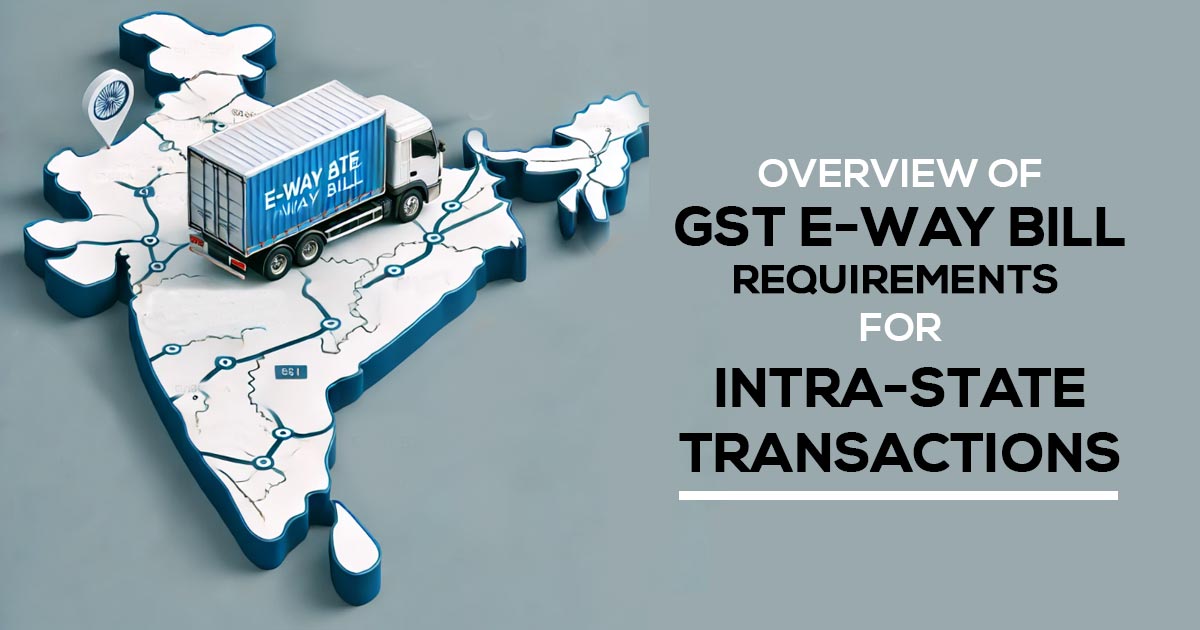
Under the Goods and Services Tax (GST) regime in India, the e-way bill is a significant compliance possess. It ensures the facilitated movement of goods and averts tax evasion.
The blog provides a detailed overview of GST intra-state e-way bill prerequisites for tax professionals, including threshold limits, exemptions, notifications, and other relevant details.
GST E-Way Bill Generation Threshold Limits
Consignment Value Exceeding Rs 1,00,000
For goods e-way bills are obligatory surpassing Rs 1,00,000 in value in the below-mentioned states:
| Bihar | Jharkhand | Tamil Nadu |
| Delhi | Punjab | West Bengal |
| Maharashtra | Rajasthan (Threshold limit of INR 2,00,000 for intra-city movements) | – |
Consignment Value Exceeding Rs 50,000
The below-mentioned states need e-way bills for goods having a value of more than Rs 50,000:
| Andhra Pradesh | Gujarat | Karnataka |
| Madhya Pradesh (No limit for intra-district movement | All goods of any value for intra-district movement) | Telangana | Uttar Pradesh, among others |
Not Required:
Goa: E-way bills are not obligatory for the intra-state movement of goods.
Read Also: Is GST E Way Bill Mandatory For Even 1 KM of Distance?
General Exemptions from E-Way Bill Requirements
Goods with Low Value: The consignments whose value is less than Rs 2000 within the identical city or town are waived from the e-way bill requirements.
Particular Exempt Goods: Goods like alcoholic liquor for human consumption, petroleum products, and goods waived from GST.
Customs Supervised Movements: Transit cargo to/from Nepal or Bhutan and goods under customs supervision.
Relevant Notifications and Circulars for Various Indian States
Occasionally, CBIC has issued several notifications and circulars to clarify such updates for taxpayers in specific states.
CBIC Notifications
Below are the details of the relevant notification for Indian states.
Rajasthan
- Notification F.17 (131-Pt.-II)ACCT/GST/2017/6672 dated 30.03.2021.
- Notification F.17 (131-Pt.-II)ACCT/GST/2017/7713 dated 24.02.2022.
Madhya Pradesh
- Notification FA 3-08-2018-–-V (18) dated 23.03.2022.
CBIC Circulars
Below are the details of the relevant circulars for Indian states.
- Circular No. 49/23/2018-GST dated 21.06.2018: Furnihes guidance on detention and confiscation for partial consignment problems.
- Circular No. 160/16/2021-GST dated 20.09.2021: Specifies the need to hold the physical copies of the invoice at the time of goods transportation.
Additional Tax Compliance Notes
Electronic Generation: On the GST portal the e-way bill is required to be generated electronically.
Documentation Needed: The transporter should have the invoice or bill of supply including a copy of the e-way bill.
Non-Compliance Penalties: Non-compliance could directed to penalties, detention of goods, and seizure of vehicles.
Tax Professional’s Important Things
Rules for Specific State: Ensure familiarity with state-specific e-way bill limits and exemptions to prevent accidental non-compliance.
Documentation Readiness: Educate the clients on keeping the precise invoices and related documents at the time of the goods transportation.
Active Observation: Track updates regularly to notifications and circulars furnished via state governments and CBIC.
Tax professionals via complying with such norms can support the businesses in ensuring easier operations and compliance with the GST norms. For additional information or clarification constantly direct to the updated notifications and circulars furnished via the respective authorities.








